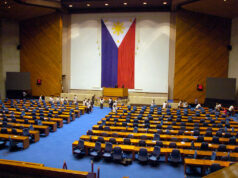Duterte back after high-stakes China visit
By Arjay L. Balinbin
Reporter
PRESIDENT Rodrigo R. Duterte returned to Manila on Sunday after his fifth visit to China, where he raised the nation’s arbitral win that voided Beijing’s claim to more than 80% of the South China Sea.
Mr. Duterte raised the issue with Chinese President Xi Jinping during his five-day visit, which the presidential palace called “highly productive,” as he faces mounting domestic pressure to take a tougher stance after a collision that sank a Filipino fishing boat at Reed Bank in June.
In a statement, Malacañang said the president’s visit renewed the commitment between the two countries to further enhance their “comprehensive strategic cooperation.”
At least six agreements were signed during Mr. Duterte’s visit, covering cooperation in education, science and technology, finance and customs, among other things. He also met with Chinese and Filipino businessmen, telling them that their investments in the Philippines would be free from corruption and would yield profit.
At his bilateral meeting on Thursday with Mr. Xi, who described him as an “old friend,” Mr. Duterte invoked the 2016 United Nations ruling that he said was “final, binding and not subject to appeal.”
His Chinese counterpart was unmoved, saying there won’t be any change to Beijing’s position on the sea dispute, according to presidential spokesman Salvador S. Panelo.
Both leaders vowed to hasten negotiations on a South China Sea Code of Conduct, the palace said.
“We know that China will not honor the Hague ruling,” Maria Ela L. Atienza, a political science professor from the University of the Philippines, said in an email yesterday. “However, the president had to raise it during this state visit, even three years late, to try to placate growing public sentiment against China,” she added.
Mr. Xi’s rejection of the arbitral ruling “shows that while cooperation in economic and other areas between the two countries are deepening, China remains the stronger, bigger country that does not respect international laws and rulings and does not treat the Philippines as an equal,” Ms. Atienza said.
The Duterte administration should have “a clear and viable plan of action,” Michael Henry Ll. Yusingco, a senior research fellow at the Ateneo de Manila University Policy Center, said in an email.
“Should the bilateral approach be reconsidered or should the multilateral approach be given some serious consideration?” he asked. “These are the questions we should be asking the administration.”
Ms. Atienza said China might be unable to dictate on the dynamics among members of the Association of Southeast Asian Nations nations. “President Duterte may not be in a strong position to lead Asean in the finalization of the Code of Conduct.”



